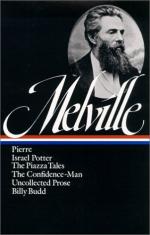“That will do,” and Israel hurried away towards the town.
“What will the loon do with the pipe?” said one. “And where goes he?” cried another.
“Let him alone,” said Paul.
The invader now disposed his whole force so as to retreat at an instant’s warning. Meantime the hardy Israel, long experienced in all sorts of shifts and emergencies, boldly ventured to procure, from some inhabitant of Whitehaven, a spark to kindle all Whitehaven’s habitations in flames.
There was a lonely house standing somewhat disjointed from the town, some poor laborer’s abode. Rapping at the door, Israel, pipe in mouth, begged the inmates for a light for his tobacco.
“What the devil,” roared a voice from within, “knock up a man this time of night to light your pipe? Begone!”
“You are lazy this morning, my friend,” replied Israel, “it is daylight. Quick, give me a light. Don’t you know your old friend? Shame! open the door.”
In a moment a sleepy fellow appeared, let down the bar, and Israel, stalking into the dim room, piloted himself straight to the fire-place, raked away the cinders, lighted his tobacco, and vanished.
All was done in a flash. The man, stupid with sleep, had looked on bewildered. He reeled to the door, but, dodging behind a pile of bricks, Israel had already hurried himself out of sight.
“Well done, my lion,” was the hail he received from Paul, who, during his absence, had mustered as many pipes as possible, in order to communicate and multiply the fire.
Both boats now pulled to a favorable point of the principal pier of the harbor, crowded close up to a part of which lay one wing of the colliers.
The men began to murmur at persisting in an attempt impossible to be concealed much longer. They were afraid to venture on board the grim colliers, and go groping down into their hulls to fire them. It seemed like a voluntary entrance into dungeons and death.
“Follow me, all of you but ten by the boats,” said Paul, without noticing their murmurs. “And now, to put an end to all future burnings in America, by one mighty conflagration of shipping in England. Come on, lads! Pipes and matches in the van!”
He would have distributed the men so as simultaneously to fire different ships at different points, were it not that the lateness of the hour rendered such a course insanely hazardous. Stationing his party in front of one of the windward colliers, Paul and Israel sprang on board.
In a twinkling they had broken open a boatswain’s locker, and, with great bunches of oakum, fine and dry as tinder, had leaped into the steerage. Here, while Paul made a blaze, Israel ran to collect the tar-pots, which being presently poured on the burning matches, oakum and wood, soon increased the flame.
“It is not a sure thing yet,” said Paul, “we must have a barrel of tar.”
They searched about until they found one, knocked out the head and bottom, and stood it like a martyr in the midst of the flames. They then retreated up the forward hatchway, while volumes of smoke were belched from the after one. Not till this moment did Paul hear the cries of his men, warning him that the inhabitants were not only actually astir, but crowds were on their way to the pier.




